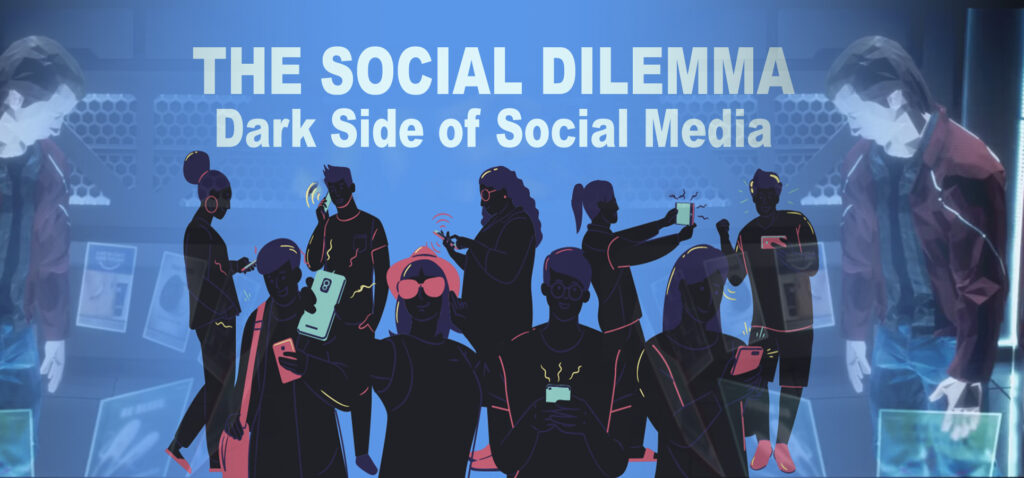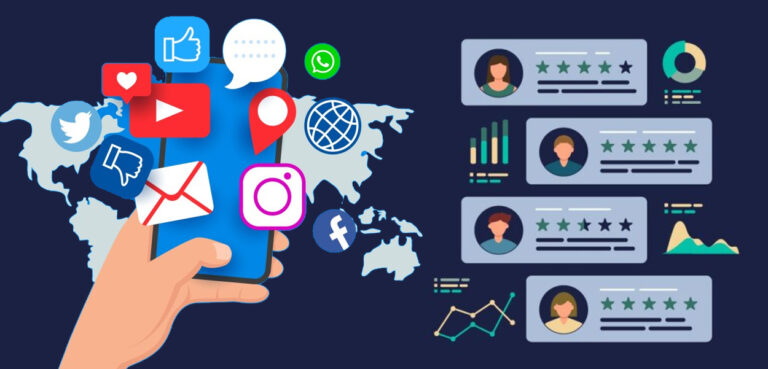
The Social Dilemma: Dark Side of Social Media
We’re living in a world where scrolling through social media feeds has become as habitual as breathing. The eye-opening Netflix documentary “The Social Dilemma” emerges as a cautionary tale that uncovers the hidden realities behind our favourite online platforms. It delves into the depths of the social media abyss, exploring the dark side of social media and the invisible strings that pull at the minds and hearts of users worldwide. As we become entangled in the web of likes, comments, shares, subscriptions and retweets, it is imperative to reflect on the potentially harmful consequences they can have on individuals and society as a whole.
The Dark Side of Social Media

Addiction is a significant concern when it comes to social media use. These platforms are designed to be addictive, creating a dopamine-driven feedback loop that keeps users hooked.
“There are only two industries that call their customers ‘users’: illegal drugs and software.”
– Edward TufteZ
Renowned American Statistician and Professor
According to studies, excessive use of social media can lead to increased rates of depression, anxiety, and loneliness. The constant comparison to others and the pressure to maintain a perfect online image can lead to low self-esteem and negative self-perception.
These Social Media sites have their own algorithms that show users content they are more likely to agree with and interact with, which can lead to the reinforcement of existing beliefs and the amplification of extreme opinions. Polarization and the decline of respectful conversations can be attributed to social media algorithms that create echo chambers.
The spread of misinformation and fake news on social media has become a significant problem, contributing to the public’s mistrust of traditional media and institutions. The platform’s algorithms prioritize engagement, inadvertently promoting sensationalist and misleading content.
The personal data of users is collected and monetized by social media platforms, as they gather information about their interests, preferences, and online behavior. This data is then sold to advertisers, who use it to create targeted ads that cater to the specific desires and needs of each user. This practice raises concerns about privacy, as individuals may not be fully aware of the extent to which their data is being used and shared. Furthermore, the use of personal data for targeted advertising opens the door for potential manipulation, as advertisers and platforms can influence users’ purchasing decisions and even their opinions on various topics.
“If you’re not paying for the product, you are the product.”
– –Shoshana Zuboff
Author of “The Age of Surveillance Capitalism”
Insights from The Social Dilemma

The Documentary talks about “The attention economy”, which monetizes users’ time and attention, leading to the development of addictive platforms that prioritize engagement over well-being.
It also delves into the algorithms that influence users’ behavior and beliefs. These algorithms are designed to predict and manipulate users’ interests, creating a personalized online experience. This customization comes at the cost of ethical concerns, as it can exploit vulnerabilities and manipulate emotions.
Should We Get Scared of AI or Embrace It?

Our journey into the digital abyss takes an intriguing turn when we consider the rise of artificial intelligence (AI). Notable figures in the tech world and beyond have expressed their apprehensions about the pervasive spread and potential misuse of AI technologies.
Geoffrey Hinton, the acclaimed pioneer of AI, has expressed his fears concerning AI’s unchecked growth. He cautions that as AI systems become more powerful and autonomous, they could potentially be used maliciously, leading to devastating effects. Hinton suggests that AI, if unregulated, could enable oppressive surveillance, enhance the spread of misinformation, or even facilitate autonomous weapons. The ‘Godfather of AI’ urges for safeguards and ethical guidelines to prevent such possible misuse and to ensure that the technology is employed to benefit humanity.
US President Joe Biden, acknowledging these concerns, summoned top tech executives including Google’s Sundar Pichai and Microsoft’s Satya Nadella to discuss AI’s safety mechanisms and to tackle the rising threats posed by this rapidly advancing technology. The goal was clear: to ensure the tech giants are taking necessary precautions against the potential dangers of AI and to establish more robust regulations to protect the public from AI-induced risks.
The world of finance is not oblivious to the rising power of AI. Legendary investor Warren Buffet has compared AI to an “atom bomb” due to its potential destructive capabilities. Buffet’s apprehensions stem from AI’s power to outperform humans in various tasks, its autonomy, and the potential for it to be exploited for harmful purposes. Despite these concerns, Buffet acknowledges the transformative potential of AI, especially in industries like healthcare and automotive.
AI, like social media, represents a powerful tool that holds both immense promise and potential threats. As users of technology and as a society, it’s crucial to stay informed, critical, and demanding of ethical considerations in these fields. As we navigate through this new age of AI, let’s tread with caution, but also embrace the potential benefits and transformations AI can bring about.
The Aftermath of the Documentary

Following the release of “The Social Dilemma,” the public response was significant, leading to a broader conversation about the role of social media in society. Social media giants, including Facebook, have been forced to address concerns raised in the documentary.
In response to the film, Facebook published an article titled “What The Social Dilemma Gets Wrong,” which attempted to counter some of the documentary’s claims and highlight the steps the company has taken to address user concerns.
Facebook argued that the documentary misrepresented certain aspects of its platform, such as the company’s commitment to combating misinformation and protecting user privacy. Facebook also highlighted the steps they have taken to address user concerns, such as implementing changes to their algorithms and developing new tools to promote user well-being.
Since the documentary’s release, social media companies have taken steps to mitigate the issues discussed in the film. These actions include increased transparency about data collection practices, the introduction of features to help users manage their time on the platforms, and efforts to combat misinformation and fake news.
Conclusion

This eye-opening documentary has started important discussions about the ethical issues and social impact of our online activities. By revealing the hidden forces that control these platforms, the film encourages us to reconsider our relationship with social media and inspires tech giants to be more transparent and accountable. It’s essential for users, particularly younger ones, to understand the risks of social media use and to approach these platforms thoughtfully.
We can work together to build a more responsible and ethical digital environment by encouraging digital literacy, supporting healthier online habits, and demanding more from the companies shaping our virtual world.

